
Embarking on a career in nursing is a noble and rewarding journey, filled with opportunities to make a positive impact on the lives of others. The first step in this path is choosing the right nursing program.
Understanding Nursing Programs:
Nursing programs vary in structure and level, ranging from diploma and associate degree programs to bachelor’s and advanced degree programs. Each level prepares students for different roles in the healthcare sector.
Diploma and Associate Degree Programs: These programs typically take 2 to 3 years to complete and focus on practical skills and foundational knowledge. Graduates are eligible to become Registered Nurses (RNs).
Bachelor of Science in Nursing (BSN): BSN programs are four-year degrees that provide a broader education in nursing, including leadership and critical thinking skills. Many healthcare institutions prefer hiring BSN-prepared nurses for their advanced knowledge.
Master of Science in Nursing (MSN): MSN programs are for those who wish to specialize in a particular area of nursing, such as nurse practitioner, nurse educator, or nurse administrator. These programs usually require a BSN as a prerequisite.
Doctor of Nursing Practice (DNP) and Ph.D. in Nursing: These terminal degrees are for nurses seeking the highest level of education and often lead to advanced practice roles or positions in academia, research, or leadership.
Read More: What do Graduates do
Specializations in Nursing:
Nursing offers a diverse range of specializations, allowing individuals to tailor their careers to their interests and passions. Some common specializations include:
Family Nurse Practitioner (FNP): Providing primary care to individuals and families, FNPs play a crucial role in preventive care and health promotion.
Pediatric Nursing: Focused on the care of infants, children, and adolescents, pediatric nurses work in various settings, including hospitals and clinics.
Critical Care Nursing: Working in intensive care units (ICUs) and emergency departments, critical care nurses handle patients with severe illnesses or injuries.
Nurse Educator: Teaching and training the next generation of nurses, nurse educators work in academic institutions and healthcare settings.
Nursing is a demanding profession that requires a unique blend of skills, dedication, and compassion. Some key aspects of the nursing profession include:
Compassion and Empathy: Nurses must connect with patients on a personal level, providing emotional support in addition to medical care.
Critical Thinking: Nurses often face complex and dynamic situations that require quick thinking and sound decision-making.
Adaptability: Healthcare is constantly evolving, and nurses need to adapt to new technologies, treatments, and protocols.
Communication Skills: Effective communication is vital in nursing, whether interacting with patients, families, or members of the healthcare team.
To conclude, choosing a nursing program is the first step toward a fulfilling and impactful career in healthcare. Whether pursuing an associate degree, a bachelor’s degree, or an advanced degree, aspiring nurses have a range of options to suit their goals and interests. With dedication, continuous learning, and a commitment to compassionate care, nursing professionals play a crucial role in shaping the future of healthcare and improving the well-being of individuals and communities.
Embark on a transformative higher education journey and elevate your path to academic success with the expert guidance and personalized support of an Ivy Central college counselor.
Read More: Exploring Egyptology and Assyriology
